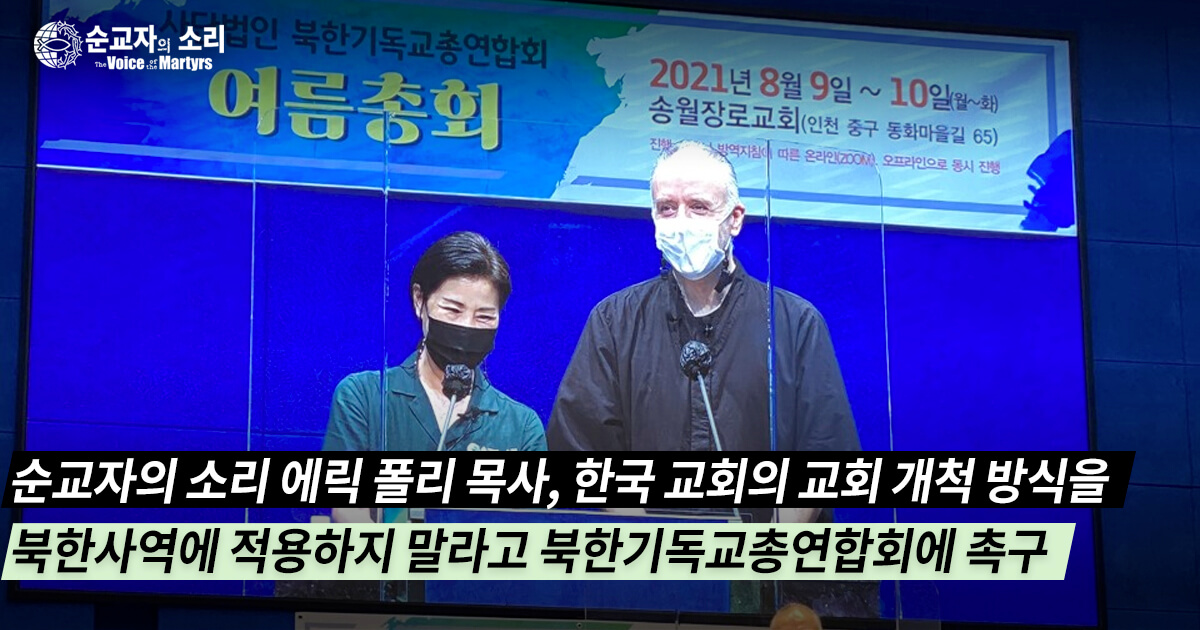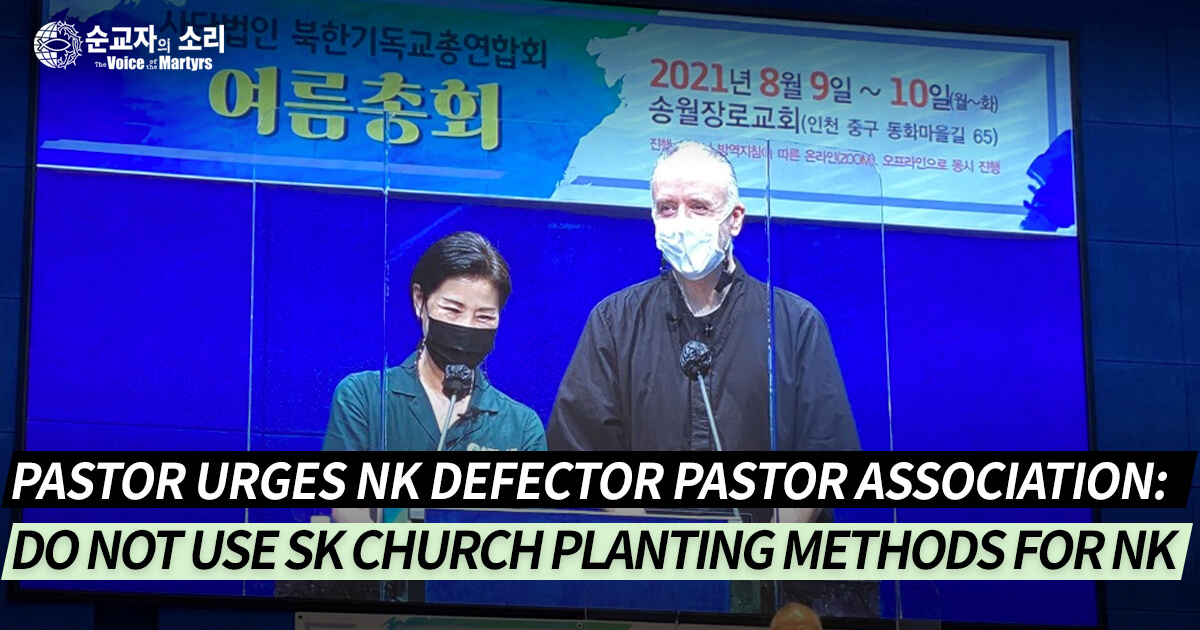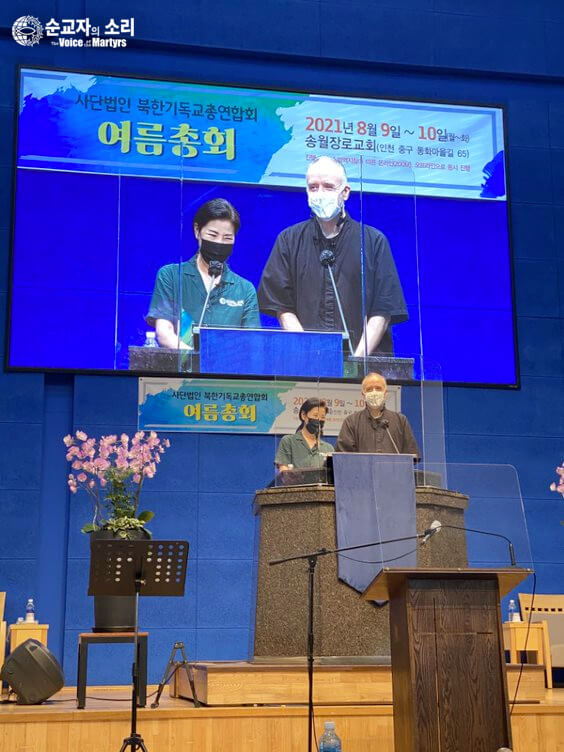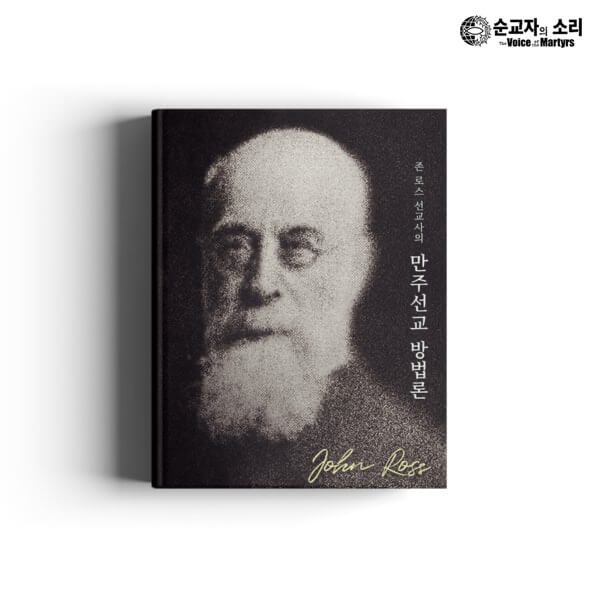
PASTOR URGES NK DEFECTOR PASTOR ASSOCIATION: DO NOT USE SK CHURCH PLANTING METHODS FOR NK

Speaking to North Korean defector pastors at the Bukkichong North Korean Defector Pastors Association summer retreat on August 10, Voice of the Martyrs Korea CEO Pastor Eric Foley urged the association members to become proficient in North Korean underground church planting methods and to apply these in both North and South Korea, instead of using South Korean methods.
“Years ago when the Soviet Union collapsed, Western missionaries rushed in to Russia, bringing their Western church planting methods with them. It made our Voice of the Martyrs founder, Pastor Richard Wurmbrand sad,” said Pastor Foley. “The Western missionaries wrongly acted as if both Communism and the underground Russian church had failed, when in reality the underground Russian church was spiritually stronger than the church in the West. Pastor Wurmbrand said, ‘Western Christians should rush in to Russia, but only for the purpose of sitting at the feet of the underground Russian Christians who remained faithful witnesses under Communism.’”

Voice of the Martyrs Korea CEO Pastor Eric Foley and Representative Dr. Hyun Sook Foley address North Korean defector pastors at the Bukkichong North Korean Defector Pastors Association summer retreat on August 10.
Pastor Foley told the North Korean defector pastors, “God has not called you to bring South Korean Christianity to North Korean people. The North Korean underground church is not defeated. It is the South Korean church that is defeated and in need of repentance and revival. It has lost its spiritual strength. It needs to sit at the feet of the North Korean underground Christians who have faithfully kept the word of God alive under four generations of Communist persecution.”
“We wrongly think because the South Korean church has money and buildings and seminaries, God has said ‘yes’ to it, and because the North Korean underground church faces constant persecution and has no earthly treasure, that God has said ‘no’ to it,” said Pastor Foley. “But this is human thinking, not God’s thinking.” He noted that despite fierce persecution, the North Korean underground church has been growing at the same time the South Korean church has been mired in decades of numeric decline, according to most estimates.
Pastor Foley called the North Korean underground church “the church built according to the John Ross method” and the South Korean church “the church built according to the method of Appenzeller, Underwood, and Allen”. “Ross’ strategy was simple,” said Pastor Foley. “Translate the Bible. Distribute it. Trust that as people read it, they would meet Christ because he is fully present in his word.” He described the method of Appenzeller, Underwood, and Allen as a “humanitarian aid-based outreach strategy” in which Koreans’ interest in Christianity came through a demonstration of its power and attractiveness, especially through the creation of social institutions like schools, orphanages, and hospitals. “At first it would appear that the method of Appenzeller, Underwood, and Allen was more effective,” said Pastor Foley. “But today the social institutions founded by the earliest missionaries have become secular and no longer advance the gospel. In fact, many of these formerly Christian universities are increasingly hostile to the Christian faith.”
By contrast, said Foley, the method of John Ross has enabled North Korean underground churches to survive the destruction of all the church-related institutions planted by missionaries. “Unlike the shrinking South Korean church of Appenzeller, Underwood, and Allen, nothing that has descended from the North Korean underground church of John Ross has been lost,” said Pastor Foley.

Voice of the Martyrs Korea’s contemporary translation of Missionary John Ross’ Mission Methods in Manchuria
Pastor Foley said that growing hostility against Christianity in South Korea will require the South Korean church to rely increasingly on Ross’ Bible-only method. “The Lord Jesus warned us in his word that from now until the day he returns, we will face more and more hostility from the world, not less—even here in South Korea,” said Pastor Foley. “The time is here when the Lord’s people can no longer freely worship or drink coffee or meet in their church buildings, or be trained and receive certificates in person at their seminaries, or have enough money to fund church planting projects in North Korea in 2028, such as has been planned. The time is here in which the Lord intends to lead his people out of buildings and out of seminaries and out of a humanitarian aid mindset so that he can be present to his people through his word alone—the Bible—and to have his people meet with him in the ordinary places of their everyday lives, not mediated by pastors or buildings or megachurch programs.”
Pastor Foley acknowledged that many South Koreans and even some North Korean defector pastors continue to doubt the existence of the underground North Korean church. “The reason some deny the existence of the North Korean underground church is that they use the characteristics of the South Korean church—ordained pastors, church buildings, corporate Christian worship—as their criteria to answer the question. They then conclude, no, there are no ordained pastors, church buildings, or corporate Christian worship in North Korea, so there is no underground North Korean church. But after 70 years of data gathering we know now with certainty that the North Korean underground church exists. We can trace its continuous existence back to the entry of the gospel into South Korea through the work of John Ross. In fact, we actually know quite a bit about the characteristics of the North Korean underground church, its worship and discipleship practices, and even some of its history and some of its people, especially its martyrs.” Pastor Foley referenced his own book, These are the Generations, as documenting the existence and practices of the North Korean underground church and advocating their emulation by South Korean Christians.
“North Korean Christianity is the true heir of the earliest Korean Christians, who were called ‘Bible Christians’,” concluded Pastor Foley. “God is pruning the South Korean church of its Western style Christianity that is built on pastors and seminaries and ordination and denominations and humanitarian aid-style outreach strategies and coffee shops. He intends that the NK underground church will purify and revive South Korean Christianity and become the church of unification.”
The video of Pastor Foley’s full message, with translation by Voice of the Martyrs Korea Representative Dr. Hyun Sook Foley, is accessible for free viewing at https://youtu.be/xTlp9e0Fp24. Foley’s books, as well as a contemporary translation of John Ross’ Mission Methods in Manchuria, are available at https://vomkorea.com/store/.

